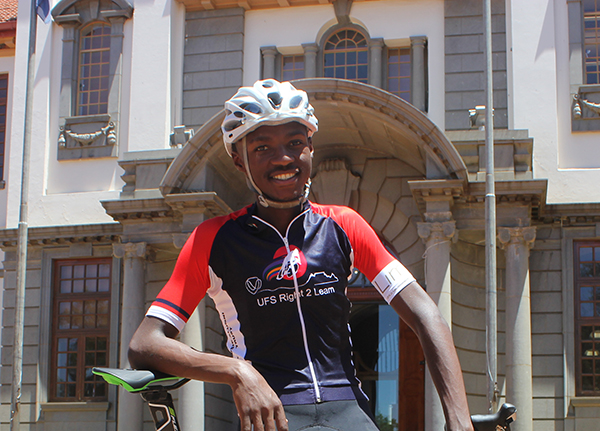Latest News Archive
Please select Category, Year, and then Month to display items
10 March 2022
|
Story Anthony Mthembu
|
Photo Unsplash
 The No Student Hungry team gearing up to start distributing food parcels to the selected students.
The No Student Hungry team gearing up to start distributing food parcels to the selected students.
The UFS is one of the many institutions of higher learning where food insecurity is an active issue. However, the
No Student Hungry Programme is one of the initiatives launched at the university to assist in fighting food insecurity at the institution.
The purpose of the programme
Since its inception in 2011, the initiative has assisted many students in acquiring a healthy meal. Additionally, the Food Environment Office also hands out food packages, so that students can continue to achieve academically. “We are trying to develop a healthy environment for students and make it easier for them to have a nice and healthy meal,” stated Annelize Visagie, who heads the Food Environment Office at the UFS. The Food Environment programme is spread out on all three campuses, each with its own facilitators. Furthermore, the programme mainly caters for students who are not funded by the National Student Financial Aid Scheme (NSFAS) but who are excelling academically. The abovementioned students apply for assistance online, and a list is then drawn up of students who receive assistance for the year.
Alternative solutions to keep the initiative running
On the Bloemfontein Campus, the No Student Hungry Programme will be catering for 200 students in the 2022 academic year, assisting them with a daily nutritious meal. Additional food parcels are also handed out to provide further assistance. “We give food parcels to the students on the list every Tuesday and Thursday at the Thakaneng Bridge,” Visagie highlighted. However, she argues that catering for the student population through this programme can be a challenge, as the demand for assistance is growing rapidly and the ability to assist is limited. The programme relies on partnerships and sponsors to assist the student body. In fact, the coordinators of the programme currently have a memorandum of understanding with Tiger Brands according to which they deliver around 100 food parcels for distribution.
In addition, the coordinators have put in place alternative measures to ensure that they can provide more food to students. “The
Kovsie Act Office, in partnership with the
Department of Sustainable Food Systems and Development, has started a food garden where healthy and nutritious produce are grown, in order to add value to the distribution,” she indicated. Although the programme can only assist to a point, students who are in desperate need of assistance are never turned away. In fact, the
Social Support Unit at Thakaneng Bridge usually assists students with food vouchers for a maximum of four days.
A commitment to teaching healthy eating habits
The programme is not only committed to curbing food insecurity, but also to ensuring that students have a healthy and balanced diet. As such, a booklet is being issued by the
Department of Nutrition and Dietetics in collaboration with the Department of Sustainable Food Systems and Development, which contains ways in which students can make a healthy meal using some of the ingredients offered in the food parcels.
“We want to teach students how to eat healthy in the cheapest way, because they don’t have a lot of money to buy expensive food products,” Visagie argued.
Kovsies SRC President cycles to raise money for registration
2017-11-27

Asive Dlanjwa, Bloemfontein SRC President, will cycle to Cape Town to
raise money for the 2018 registrations.
Photo: Moeketsi Mogotsi
“When I came to the University of the Free State (UFS), all I had was a R50 note and I did not know how I was going to register.” This is what Bloemfontein Campus SRC President, Asive Dlanjwa, encountered when he arrived at the UFS. He says the biggest struggle for students is not having finances for registration at the beginning of the year.
R2 million to be raised for 2018 registration
It is for this reason that Dlanjwa will be partaking in the Right to Learn Cycle tour challenge from 27 November to 4 December 2017. The Student Representative Council (SRC), in partnership with Institutional Advancement, came up with this initiative to cycle from Bloemfontein to Cape Town in eight days in an effort to raise R2 million for 2018 registration.
Bringing hope to prospective students and their families
Dlanjwa says, “We want to give access to as many students as possible. This initiative is not only about the students, it’s about giving hope to their families and taking them out of poverty.” He recalls an incident where a student went to the SRC offices to seek help at the beginning of the year, with nothing but an identity document and the clothes he had on. The student had been sleeping at the Bloemfontein Tourism Centre because he had no money for accommodation and registration. “These are the types of cases that we have to deal with at the start of each year,” says Dlanjwa.
He urges the community to partner with them in ensuring that many students get access to higher education by donating money through the Give-n-gain page. Dlanjwa, joined by a few more guest cyclists, left Bloemfontein on Monday 27 November 2017 and are expected to arrive in Cape Town on Monday 4 December 2017.